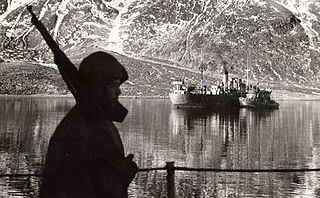Related Research Articles

Karl Heinrich Marx was a German philosopher, critic of political economy, economist, historian, sociologist, political theorist, journalist and socialist revolutionary. His best-known titles are the 1848 pamphlet The Communist Manifesto and the three-volume Das Kapital (1867–1883). Marx's political and philosophical thought had enormous influence on subsequent intellectual, economic, and political history. His name has been used as an adjective, a noun, and a school of social theory.

U-boats were naval submarines operated by Germany, particularly in the First and Second World Wars. Although at times they were efficient fleet weapons against enemy naval warships, they were most effectively used in an economic warfare role and enforcing a naval blockade against enemy shipping. The primary targets of the U-boat campaigns in both wars were the merchant convoys bringing supplies from Canada and other parts of the British Empire, and from the United States, to the United Kingdom and to the Soviet Union and the Allied territories in the Mediterranean. German submarines also destroyed Brazilian merchant ships during World War II, causing Brazil to declare war on both Germany and Italy on 22 August 1942.

The Battle of the Atlantic, the longest continuous military campaign in World War II, ran from 1939 to the defeat of Nazi Germany in 1945, covering a major part of the naval history of World War II. At its core was the Allied naval blockade of Germany, announced the day after the declaration of war, and Germany's subsequent counter-blockade. The campaign peaked from mid-1940 through to the end of 1943.

CSS Albemarle was a steam-powered ironclad gunboat ram of the Confederate Navy, named for an estuary in North Carolina which was named for General George Monck, the first Duke of Albemarle and one of the original Carolina Lords Proprietor.

USS Harder (SS-257), a Gato-class submarine, was the first ship of the United States Navy to be named for the harder, a fish of the mullet family found off South Africa. One of the most famous submarines of World War II, she received the Presidential Unit Citation. Her commanding officer throughout her service, the resolute and resourceful Commander Samuel D. Dealey (1906–1944), "a submariner's submariner", was posthumously awarded the Medal of Honor, as well as four Navy Crosses during his lifetime.
The first USS Parche (SS-384/AGSS-384) was a United States Navy submarine. She bore the name of a butterfly fish, Chaetodon capistratus.

USS Pomfret (SS-391), a Balao-class submarine, was a ship of the United States Navy named for the pomfret, a fish of the seabream family which is a powerful and speedy swimmer, capable of operating at great depths.

The American Theater was a theater of operations during World War II including all continental American territory, and extending 200 miles (320 km) into the ocean.
Beginning in ancient times, mankind sought to operate under the water. From simple submersibles to nuclear submarines, humans have searched for a means to remain safely underwater to gain the advantage in warfare, resulting in the development of the submarine.

All That Is Solid Melts into Air: The Experience of Modernity is a book by Marshall Berman written between 1971 and 1981, and published in New York City in 1982. The book examines social and economic modernization and its conflicting relationship with modernism. The title of the book is taken from Samuel Moore's 1888 translation of The Communist Manifesto by Karl Marx and Friedrich Engels.

The Battle of the Caribbean refers to a naval campaign waged during World War II that was part of the Battle of the Atlantic, from 1941 to 1945. German U-boats and Italian submarines attempted to disrupt the Allied supply of oil and other material. They sank shipping in the Caribbean Sea and the Gulf of Mexico and attacked coastal targets in the Antilles. Improved Allied anti-submarine warfare eventually drove the Axis submarines out of the Caribbean region.

HMS Sickle was a third-batch S-class submarine built for the Royal Navy during World War II. Completed in 1942, she made her initial war patrol off the Norwegian coast. Sickle then sailed to Gibraltar, from where she conducted one patrol, then to Algiers, French North Africa. From 10 May to 10 October, the boat patrolled the Gulf of Genoa five times and sank a German submarine as well as three minesweepers and an escort ship. She then moved to Beirut, French Lebanon, and conducted two patrols in the Aegean Sea, sinking three caïques and a merchant ship, in addition to landing resistance operatives in Greece.

Allied submarines were used extensively during the Pacific War and were a key contributor to the defeat of the Empire of Japan.

The Atlantic U-boat campaign of World War I was the prolonged naval conflict between German submarines and the Allied navies in Atlantic waters—the seas around the British Isles, the North Sea and the coast of France.
"Sighted sub, sank same" was a signal sent by an American airman during World War II.
Convoy HX 90 was a North Atlantic convoy of the HX series which ran during the Battle of the Atlantic in World War II.
Alan C. Carey is an American author and historian who specializes in military aviation topics.
Jonathan Sperber is an American academic and historian who is a professor emeritus at the University of Missouri and author of modern European History.

Karl Marx was a German philosopher, economist, sociologist, historian, journalist, and revolutionary socialist. Marx's work in economics laid the basis for the current understanding of labour and its relation to capital, and has influenced much of subsequent economic thought. He published numerous books during his lifetime, the most notable being The Communist Manifesto. Marx studied at the University of Bonn and the University of Berlin, where he became interested in the philosophical ideas of the Young Hegelians. After his studies, he wrote for a radical newspaper in Cologne, and began to work out his theory of dialectical materialism. He moved to Paris in 1843, where he began writing for other radical newspapers and met Fredrick Engels, who would become his lifelong friend and collaborator. In 1845 he was exiled and moved to London together with his wife and children where he continued writing and formulating his theories about social and economic activity. He also campaigned for socialism and became a significant figure in the International Workingmen's Association.
Karl Marx was a German philosopher, economist, sociologist, journalist, and revolutionary socialist. Born in Trier to a middle-class family, he later studied political economy and Hegelian philosophy. For a general review of Karl Marx biographies, see the article "Two Centuries of Karl Marx Biographies: An Overview" by Angelo Segrillo.
References
- ↑ Biographical note contained in the Collected Works of Karl Marx and Frederick Engels: Volume 10 (International Publishers: New York, 1978) p. 718.
- ↑ Sperber, Jonathan (2013-03-11). Karl Marx: A Nineteenth-Century Life. W. W. Norton & Company. ISBN 978-0-87140-354-4.